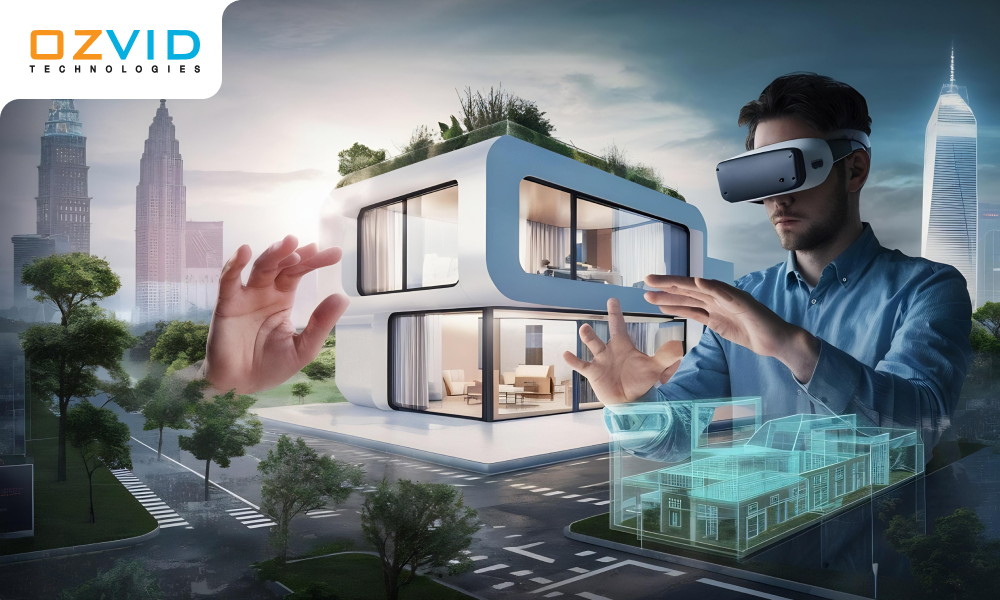- Dec 30, 2025
Share this post on:

Did you know that the AI in real estate market reached $222.65 billion in 2024? It is projected to grow to $975.24 billion by 2029 at a CAGR of 34.1%. Artificial Intelligence (AI) is no longer a futuristic concept; it has become a driving force behind digital transformation in almost every industry, and real estate is no exception. The adoption of ai in real estate has changed the way properties are discovered, marketed, and managed, creating smarter and more personalized experiences for customers. From predictive analytics that help investors make informed decisions to chatbots that provide instant support for buyers and tenants, AI is redefining customer engagement at every stage of the property journey.
Whether it’s through home buying apps, property finder app solutions, or advanced commercial real estate app platforms, the integration of real estate ai ensures faster processes, accurate valuations, and a seamless experience for customers. This transformation is not just about automation, it is about enhancing trust, personalization, and convenience, ultimately revolutionizing how people interact with the real estate market.
Key Takeaways
- AI in real estate enhances customer experience with personalized recommendations and seamless engagement.
- Businesses leverage AI for accurate property valuations, predictive analytics, and better investment decisions.
- AI integration in real estate apps streamlines property search, marketing, and transactions.
- Despite challenges, AI offers scalable, cost-effective, and long-term value-driven solutions.
- The future of real estate and AI promises smarter cities, sustainable housing, and immersive property experiences.
Importance of AI in Real Estate
The real estate sector has traditionally been information-heavy and process-heavy, market trends, property records, tenant histories, pricing signals, legal checks, and more. Historically, much of this information lived in spreadsheets, institutional memory, or fragmented systems. The arrival of ai real estate technologies addresses three core industry needs:
Better decision-making through predictive insights
AI models can analyze historical sales, demographic shifts, economic indicators, and local development patterns to forecast prices, rental yields, and demand trends. When real estate professionals have access to these predictions, customer advice becomes far more actionable and personalized.
Faster, more convenient customer journeys
Consumers today expect instant, relevant recommendations. Home buyers using home buying apps and property searchers using a property finder app want results tailored to their preferences, quick virtual tours, and seamless communication with agents. AI-powered interfaces deliver this immediacy.
Operational efficiency and cost reduction
Automation - from lead qualification to lease renewals and maintenance scheduling - reduces repetitive work and frees staff to focus on high-value customer interactions. This directly improves engagement: customers interact with knowledgeable staff and responsive systems rather than slow manual processes.
For real estate agencies, developers, property managers, and investor firms, real estate and ai integration is not just a technical upgrade, it is a strategic investment in customer satisfaction, retention, and long-term competitiveness.
Features of AI in Real Estate for Businesses and Customers
Artificial Intelligence offers unique value to both businesses operating in the real estate sector and customers interacting with property platforms. While businesses benefit from data-driven insights, efficiency, and revenue growth, customers experience smoother, faster, and more personalized journeys. Below, we break down five key features tailored to each group.
Features of AI in Real Estate for Businesses
Automated Property Valuation Models (AVMs)
For real estate businesses, accurate property valuation is critical to pricing strategies and negotiations. AI-powered AVMs analyze market trends, comparable sales, neighborhood data, and property attributes to provide instant and reliable price estimates. This reduces the reliance on manual evaluations, saves time, and ensures consistency across multiple listings.
Predictive Market Analytics for Better Investment Decisions
Businesses need foresight to stay competitive. AI systems use predictive analytics to forecast housing demand, rental yields, vacancy rates, and long-term price appreciation. These insights empower real estate firms and investors to make informed decisions, reduce risk, and maximize returns.
Lead Scoring and Conversion Optimization
Managing hundreds of leads manually often results in wasted resources. AI can score and prioritize leads based on buyer intent, browsing behavior, and interaction history. By focusing on high-potential leads, businesses improve conversion rates, reduce acquisition costs, and enhance overall sales efficiency.
Dynamic Pricing and Revenue Management
AI algorithms allow businesses to adopt dynamic pricing strategies by adjusting property prices or rents in real-time based on demand, seasonality, competitor activity, and market conditions. This ensures maximum occupancy for rental properties and higher profitability for sellers.
Streamlined Property Management and Maintenance
Property managers often face challenges with tenant requests, maintenance scheduling, and operational costs. AI-driven solutions automate rent reminders, detect potential equipment failures through IoT integration, and even predict maintenance needs before they become expensive issues. This improves efficiency and builds long-term tenant satisfaction.
Features of AI in Real Estate for Customers
Personalized Property Recommendations
Customers no longer have to scroll through irrelevant listings. AI tracks their preferences, location history, budget, and lifestyle choices to recommend properties that truly match their needs. This reduces search fatigue and creates a more tailored property discovery process.
24/7 Virtual Assistance through Chatbots
AI-powered chatbots and voice assistants provide instant answers to customer queries about property details, availability, or pricing. This ensures buyers, sellers, or tenants receive round-the-clock support without waiting for human intervention, enhancing overall convenience.
Immersive Virtual Tours and Augmented Reality Experiences
Customers can now explore properties remotely through AI-enhanced virtual tours. Augmented reality (AR) features allow them to visualize furniture placement, renovation options, or design changes before making decisions, creating a more engaging and informed buying experience.
Faster and More Transparent Transactions
AI simplifies paperwork, automates verification processes, and assists with mortgage pre-approvals, making transactions smoother and faster. Customers benefit from reduced delays, fewer errors, and more transparency throughout the buying or renting process.
Accurate Property Valuations and Market Insights
Buyers and sellers often struggle with understanding true property value. AI provides real-time, data-backed valuations and market insights, helping customers make confident decisions about whether a property is fairly priced or if it is a good investment opportunity.
Applications of AI in Real Estate
AI’s practical applications in real estate cut across residential, commercial, and platform-centric solutions. Below are key application areas with detailed descriptions:
Residential Sales and Marketing
AI powers targeted campaigns, segmented audiences, and optimized listing placements. When integrated into home buying apps, AI can recommend mortgage options, suggest neighborhoods based on lifestyle attributes, and schedule viewings automatically. This combination gives buyers a guided, less stressful journey.
Property Search Platforms and Property Finder Apps
A dedicated property finder app enhanced with AI offers conversational search, voice queries, and image-based searches (e.g., users upload photos of a design and find similar properties). These features increase engagement and session time, improving conversion rates.
Commercial Real Estate and Asset Management
Commercial real estate app solutions with AI help in site selection, tenant mix optimization, and lease management. Predictive analytics guide investment decisions and model potential returns for retail, office, and industrial assets.
Property Management and Tenant Experience
Property managers benefit from AI-driven tenant portals that automate rent reminders, handle maintenance tickets via chat, and use sentiment analysis to preemptively address tenant dissatisfaction. This reduces churn and improves retention.
Mortgage Underwriting and Risk Assessment
Lenders and proptech platforms use AI to analyze alternative data, employment patterns, transaction histories, social indicators, to make faster, fairer lending decisions. This speeds approvals for customers and lowers default risk for lenders.
Virtual Staging and Augmented Reality Experiences
AI enables high-quality virtual staging and interactive walk throughs. Buyers can visualize potential renovations, which increases emotional engagement and reduces time on market.
Investment Analysis and Portfolio Optimization
For investors, AI synthesizes transaction-level data, macro trends, and property-level indicators to build portfolios that optimize yield while managing risk.
Customer Service and After-Sale Support
AI chatbots and email assistants handle paperwork reminders, post-sale queries, and warranty issues, improving post-purchase experience and building loyalty.
Lead Generation for Brokers and Agents
By analyzing browsing patterns and off-platform behavior, AI identifies high-intent prospects and alerts agents, enabling timely outreach with highly relevant offers.
Integrated Real Estate Platforms
Integrated platforms that combine real estate app development, AI analytics, and CRM capabilities provide end-to-end solutions, from listing creation to closing and property management, streamlining the entire customer lifecycle.
If your organization is planning to build a real estate app or integrate AI into an existing platform, understanding these applications is the first step toward drafting precise product requirements.
Step by Step Implementation of AI in Real Estate
Implementing AI in real estate industry requires a strategic, step-by-step approach. Businesses cannot simply integrate AI overnight, it involves understanding goals, preparing data, choosing the right technology, and ensuring smooth adoption. Below is a structured roadmap for AI implementation in real estate.
1. Identify Business Objectives and Pain Points
Before adopting AI, businesses must have clarity on what they want to achieve. AI should solve real problems rather than being added as a trend.
- Pinpoint challenges such as slow property searches, inaccurate valuations, low lead conversions, or operational inefficiencies.
- Define measurable goals like improving customer engagement, reducing costs, or increasing property sales.
- Align AI initiatives with long-term business strategies, ensuring they contribute to growth and competitiveness.
2. Collect and Organize Real Estate Data
AI thrives on high-quality data, and the real estate sector generates enormous volumes of it. Preparing the right dataset is essential.
- Gather structured data (property listings, sales history, pricing trends) and unstructured data (images, videos, customer queries).
- Ensure data accuracy by removing duplicates, errors, and outdated information that could distort AI outcomes.
- Use secure storage solutions to manage sensitive customer and property data while maintaining compliance with data protection regulations.
3. Choose the Right AI Tools and Technologies
The success of AI implementation depends on selecting tools that fit business requirements.
- Evaluate whether you need chatbots, predictive analytics engines, recommendation systems, or virtual assistants.
- Consider partnerships with an AI development company that specializes in real estate app development for tailored solutions.
- Select platforms that are scalable, so they can evolve as your customer base and property listings grow.
4. Integrate AI into Real Estate Applications
Integration is the stage where AI capabilities are embedded into existing systems and customer-facing apps.
- Enhance a property finder app or home buying app with AI-driven search filters and recommendations.
- Deploy AI-powered chatbots within real estate apps or websites to provide instant customer support.
- Implement smart valuation and pricing models inside commercial real estate apps to assist agents and investors.
5. Train and Test the AI Models
AI models must be trained using historical and real-time data before deployment.
- Feed property-related datasets to AI algorithms so they learn patterns in pricing, demand, and customer behavior.
- Conduct pilot testing in small markets or selected app features before a full-scale launch.
- Continuously validate AI outputs to ensure accuracy in recommendations, valuations, and predictions.
6. Ensure User Adoption and Staff Training
The value of AI comes only when both staff and customers use it effectively.
- Train real estate agents and employees on using AI-enabled tools, dashboards, and insights.
- Educate customers about features like virtual tours, chatbots, and personalized recommendations in real estate apps.
- Create user-friendly interfaces so adoption becomes seamless for non-technical stakeholders.
7. Monitor, Optimize, and Scale AI Solutions
AI is not a one-time setup, it evolves with changing markets and customer behavior.
- Continuously monitor AI performance against KPIs like customer engagement, property sales, and cost reduction.
- Optimize algorithms with fresh datasets to ensure accuracy in valuations, market predictions, and recommendations.
- Scale AI solutions by integrating advanced features such as AR/VR tours, fraud detection, and dynamic pricing models.
Cost to Integrate AI in Real Estate
The cost of AI into real estate depends on multiple factors such as the scope of the project, the type of application being developed, the complexity of AI models, and the level of customization required. Since no two businesses have identical needs, the investment can vary widely. However, understanding the main cost drivers helps in setting realistic budgets and avoiding unexpected expenses.
1. Type of AI Solution Implemented
Different AI applications come with different cost brackets depending on their complexity.
- AI Chatbots and Virtual Assistants: Simple AI-powered chatbots for customer support are relatively affordable, costing less than predictive analytics or advanced recommendation engines.
- Property Valuation Models: Automated valuation models require advanced machine learning algorithms and access to large datasets, making them more resource-intensive.
- Virtual Tours and AR/VR Integration: Implementing AI-driven virtual tours or AR-based property visualization costs more due to the use of 3D modeling and immersive technologies.
2. Complexity of Features in Real Estate Apps
The more advanced and personalized the features, the higher the cost of integration.
- Basic Features: AI-powered property search, filtering, and recommendations.
- Intermediate Features: Predictive analytics for property pricing, fraud detection, and customer behavior tracking.
- Advanced Features: Full-scale home buying apps, commercial real estate apps, and property finder apps with AI-driven dynamic pricing, AR/VR, and voice-based assistants.
3. Data Collection and Management Costs
AI is only as good as the data it learns from, and preparing this data requires investment.
- Collecting and cleaning property-related data such as historical sales, customer preferences, and neighborhood details.
- Setting up secure storage systems to comply with privacy regulations and avoid risks in handling customer data.
- Ongoing data management to keep the AI system accurate and up to date.
4. Development and Integration Costs
This depends largely on the choice of the AI development company and the expertise required.
- Hiring an experienced real estate app development company increases quality but also adds to the cost.
- Custom-built solutions tailored for specific business needs are more expensive than off-the-shelf tools.
- Integration with existing real estate apps or platforms requires additional resources to ensure seamless performance.
5. Maintenance and Upgrades
AI systems require continuous monitoring and optimization, adding to long-term costs.
- Regular updates to keep algorithms accurate with changing property market dynamics.
- Upgrading apps with new features such as smarter chatbots or enhanced property recommendation engines.
- Providing customer support and technical assistance to ensure smooth operations.
6. Estimated Cost Range
While actual costs vary based on scope and customization, here’s a general estimation for businesses:
- Basic AI features (chatbots, simple search filters): $10,000 – $25,000
- Intermediate solutions (predictive analytics, AI valuations): $25,000 – $60,000
- Advanced applications (AI-powered commercial real estate app, AR/VR tours, full-scale AI integration): $60,000 – $150,000+
Cost Factor | Details | Estimated Range |
|---|---|---|
Type of AI Solution | - AI Chatbots & Virtual Assistants: Affordable, basic automation. | $10,000 – $80,000 |
Complexity of Features | - Basic: AI search filters & property recommendations. | $15,000 – $150,000+ |
Data Collection & Management | - Collecting and cleaning property data. | $5,000 – $25,000 |
Development & Integration | - Hiring a skilled AI development company or real estate app development company. | $20,000 – $70,000 |
Maintenance & Upgrades | - Regular updates to AI algorithms. | $5,000 – $20,000 annually |
Cost Overview Based on Scope
AI Integration Scope | Examples | Estimated Cost |
|---|---|---|
Basic AI Features | Chatbots, simple property search & filter tools | $10,000 – $25,000 |
Intermediate AI Solutions | Predictive analytics, automated property valuations | $25,000 – $60,000 |
Advanced AI Applications | Full-scale commercial real estate app, AR/VR property tours, dynamic pricing engines | $60,000 – $150,000+ |
Benefits of AI in Real Estate
Implementing ai in real estate unlocks multiple advantages - both tangible and strategic. Below we explain in practical terms how AI benefits stakeholders across the property ecosystem.
Faster, More Relevant Customer Experiences
AI enables instant responses, accurate recommendations, and personalized journeys on real estate app platforms. This reduces friction and elevates customer satisfaction.
Increased Lead Conversion and Agent Productivity
Intelligent lead scoring and automated follow-ups ensure agents spend time on the highest-value leads, improving conversion rates and lowering customer acquisition costs.
Data-Driven Pricing and Valuations
AVMs and dynamic pricing engines deliver more accurate valuations and better pricing strategies, resulting in shorter listing times and optimized rental income.
Scalability and 24/7 Availability
Chatbots and automated customer workflows provide around-the-clock service, enabling platforms to serve more users without proportionally increasing headcount.
Improved Risk Management
AI-driven tenant screening, fraud detection, and lender risk models reduce defaults and financial exposure for property owners and lenders.
Enhanced Marketing ROI
Personalized campaigns, automated content generation, and audience segmentation increase engagement and reduce wasted ad spend.
Operational Cost Reduction
Automated administrative tasks, maintenance prediction, and streamlined workflows reduce manual effort and operational costs.
Better Customer Insights
AI analyzes behavior across home buying apps, web platforms, and offline interactions to highlight trends, preferences, and pain points, informing product and service improvements.
Collectively, these benefits translate to faster sales cycles, higher revenue per listing, reduced churn, and stronger brand loyalty, outcomes every real estate business aims for.
Also Read: How Much Does It Cost to Hire a Software Developer? A Complete Guide
Challenges and Solutions of AI Implementation in Real Estate
While the promise of real estate and ai is clear, implementation faces real-world challenges. Below we list common obstacles and practical solutions that OZVID Technologies applies when delivering projects.
Data Quality and Availability
Challenge: Fragmented datasets, inconsistent formats, and missing labels make model training difficult.
Solution: Adopt a phased data strategy, start with high-quality internal datasets, implement robust ETL pipelines, and augment with vetted external sources. Use data augmentation techniques for images and synthetic data where appropriate.
Privacy and Regulatory Compliance
Challenge: Handling personally identifiable information (PII) and sensitive financial data requires strict compliance.
Solution: Implement privacy-by-design, anonymization, encryption, access controls, and regular audits. Ensure models and workflows comply with GDPR and local regulations.
Model Bias and Explainability
Challenge: AI models can unintentionally perpetuate bias in valuations or tenant screening.
Solution: Use transparent model architectures, fairness metrics, and human-in-the-loop review processes. Provide explainability features so users understand why a suggestion or score was given.
Integration with Legacy Systems
Challenge: Many real estate firms run on legacy CRMs and property databases.
Solution: Use API-first integration layers, middleware adapters, and incremental migration strategies to minimize disruption while delivering value.
Talent and Skills Gap
Challenge: Hiring and retaining data scientists and AI engineers can be difficult and expensive.
Solution: Partner with specialist firms (such as OZVID Technologies) to access cross-functional teams of engineers, data scientists, and domain experts without hiring overhead.
High Initial Costs
Challenge: Upfront investment can be significant.
Solution: Prioritize high-ROI use cases for MVPs, leverage cloud-managed services to reduce infrastructure costs, and adopt staged rollouts with measurable KPIs.
User Trust and Adoption
Challenge: Users might distrust automated valuations or chatbots.
Solution: Offer hybrid experiences where AI augments human experts, show confidence scores, and maintain easy access to human support.
Operationalizing and Maintaining Models
Challenge: Models degrade over time if not retrained with fresh data.
Solution: Implement continuous monitoring, scheduled retraining pipelines, and performance dashboards to detect drift and maintain accuracy.
Addressing these challenges proactively leads to stable, reliable AI systems that improve customer experience without unintended consequences.
Future of AI in Real Estate
The future of AI in real estate promises to transform the industry even further, creating smarter, faster, and more customer-centric processes. With growing adoption across residential and commercial sectors, AI will continue to redefine property discovery, transactions, and management. Below are some key future trends:
1. Hyper-Personalized Property Recommendations
AI will evolve to deliver hyper-personalized property recommendations by analyzing buyer lifestyle choices, commute patterns, financial profiles, and even environmental preferences. Instead of generic listings, customers will receive highly relevant suggestions, making property search seamless. This will enhance engagement and improve conversion rates for real estate businesses.
2. Widespread Use of Virtual Assistants and Chatbots
Future real estate apps will rely heavily on AI-driven virtual assistants that handle complex customer queries beyond simple FAQs. These chatbots will guide users through property tours, compare financing options, and assist with transactions. By offering 24/7 intelligent support, they will elevate the customer experience and reduce operational costs.
3. Advanced Predictive Analytics for Market Forecasting
Predictive analytics powered by AI will become indispensable for both investors and businesses. It will forecast property price movements, rental yields, and demand patterns with remarkable accuracy. This will allow stakeholders to make better investment decisions, mitigate risks, and gain a competitive edge in both residential and commercial real estate.
4. Integration of AR/VR for Immersive Property Experiences
AI will work hand in hand with Augmented Reality (AR) and Virtual Reality (VR) to create highly immersive experiences. Buyers will virtually explore neighborhoods, customize interior layouts, and visualize renovations before purchase. This will redefine property engagement, making decision-making faster, more informed, and highly interactive for customers.
5. AI-Powered Smart Cities and Sustainable Housing
The future of real estate and AI will go beyond transactions into smart urban planning. AI will optimize energy usage, predict infrastructure needs, and support eco-friendly construction. Sustainable housing projects powered by AI insights will attract buyers seeking modern, environment-conscious living, aligning with the global shift toward greener communities.
6. Blockchain and AI Integration for Transparent Transactions
Combining blockchain and AI will revolutionize real estate transactions. While blockchain ensures transparent and tamper-proof records, AI will automate verification, fraud detection, and contract management. Together, these technologies will create a secure, fast, and trustworthy ecosystem, making property buying and selling more reliable and efficient.
7. Voice-Enabled Property Search
Future home buying apps and property finder apps will integrate AI-powered voice assistants. Customers will simply describe what they are looking for, budget, location, amenities, and receive accurate matches instantly. This will simplify property search, especially for non-technical users, and make real estate apps more inclusive and user-friendly.
8. AI in Commercial Real Estate Optimization
AI will play a bigger role in commercial real estate apps by optimizing office space utilization, predicting tenant churn, and automating lease management. Businesses will use AI to adapt workspaces for hybrid models, improve tenant satisfaction, and maximize ROI. This will revolutionize commercial property management practices.
Choose OZVID Technologies for Custom AI Real Estate Solutions
As a specialized real estate app development company and AI development company, OZVID Technologies approaches AI-driven product design with deep domain expertise and engineering excellence. Here’s how we differentiate ourselves:
End-to-End Capabilities
From strategy and data engineering to model development and real estate app development, we provide full-stack services that minimize vendor coordination and accelerate delivery.
Domain-Focused Teams
Our teams combine real estate analysts, data scientists, UX designers, and mobile/web engineers who understand the specifics of the market, from MLS feeds to commercial leasing workflows, ensuring that AI solutions are practical and business-aligned.
Proven Methodology
We follow the phased approach outlined earlier, discovery, MVP, iterative improvements, and enterprise scaling. This ensures early wins and predictable ROI for clients building real estate app solutions or upgrading existing platforms.
Custom Integrations
Whether you need a consumer-facing property finder app, an intelligent home buying apps suite, or a comprehensive commercial real estate app, we integrate AI capabilities into your existing tech stack securely and cleanly.
Ethical and Compliant AI
OZVID Technologies implements privacy-first architecture, fairness testing, and explainability tools. We make sure your AI systems meet regulatory and industry best-practice standards.
Transparent Pricing and Support
We provide clear cost breakdowns with options for pilot projects, subscription-based maintenance, and managed AI services to fit budgets across startups to enterprise levels.
Ongoing Optimization and Training
AI is not a one-time deployment. We provide monitoring dashboards, retraining workflows, and continuous improvements so your real estate ai remains accurate and relevant as markets shift.
Customized Solutions for Every Use Case
Whether you are a brokerage seeking better lead conversion through intelligent CRM, a platform building a property finder app, or an enterprise requiring a commercial real estate app with portfolio analytics, we design solutions tailored to your priorities.
If you are exploring how to integrate ai in real estate or are ready to begin real estate app development, OZVID Technologies is positioned to be your trusted partner - delivering practical, scalable, and customer-focused AI products that transform engagement and business outcomes.
Conclusion
AI is reshaping the real estate industry by personalizing search, automating tedious tasks, and delivering predictive insights that improve both customer experience and business performance. From intelligent home buying apps and property finder app features to enterprise-grade commercial real estate app analytics, real estate app development infused with ai real estate capabilities is no longer optional - it is essential for competitive differentiation.
At OZVID Technologies, we combine the technical expertise of an AI development company with deep real estate domain knowledge to design and deliver solutions that drive measurable improvements in engagement, conversion, and operational efficiency. As a full-service real estate app development company, we are committed to building ethical, high-performing AI systems that put customers at the center of the property journey.
If you are ready to explore how ai in real estate can elevate your platform, streamline operations, or create delightful customer experiences, contact us today and we will help you define the strategy, build the product, and scale AI capabilities to meet your business goals.
FAQ's
1. How does AI improve property valuation in real estate?
AI uses advanced algorithms and historical sales data to generate accurate property valuations. By analyzing market trends, neighborhood data, and property features, it provides fair pricing models that benefit both buyers and sellers.
2. How are chatbots transforming customer service in real estate?
AI-powered chatbots offer 24/7 support, answer property-related queries, and guide customers through buying or renting processes. They reduce response times, improve customer engagement, and free up agents to focus on high-value interactions.
3. What technologies are transforming modern real estate apps?
Technologies such as AR/VR, big data, cloud computing, and blockchain are transforming real estate apps. They enable immersive property tours, secure transactions, data-driven insights, and enhanced scalability, delivering innovative and future-ready real estate solutions.
4. How do digital solutions enhance customer engagement in real estate?
Digital solutions such as chat support, push notifications, virtual property tours, and instant price updates improve customer engagement. They keep users connected, informed, and motivated to explore properties, creating higher satisfaction and stronger relationships with real estate companies.
5. What are the advantages of integrating AR/VR in real estate apps?
AR/VR integration allows customers to experience immersive property tours from anywhere. They can visualize layouts, furniture placement, and even renovation possibilities, reducing the need for multiple site visits and speeding up purchase or rental decisions.










